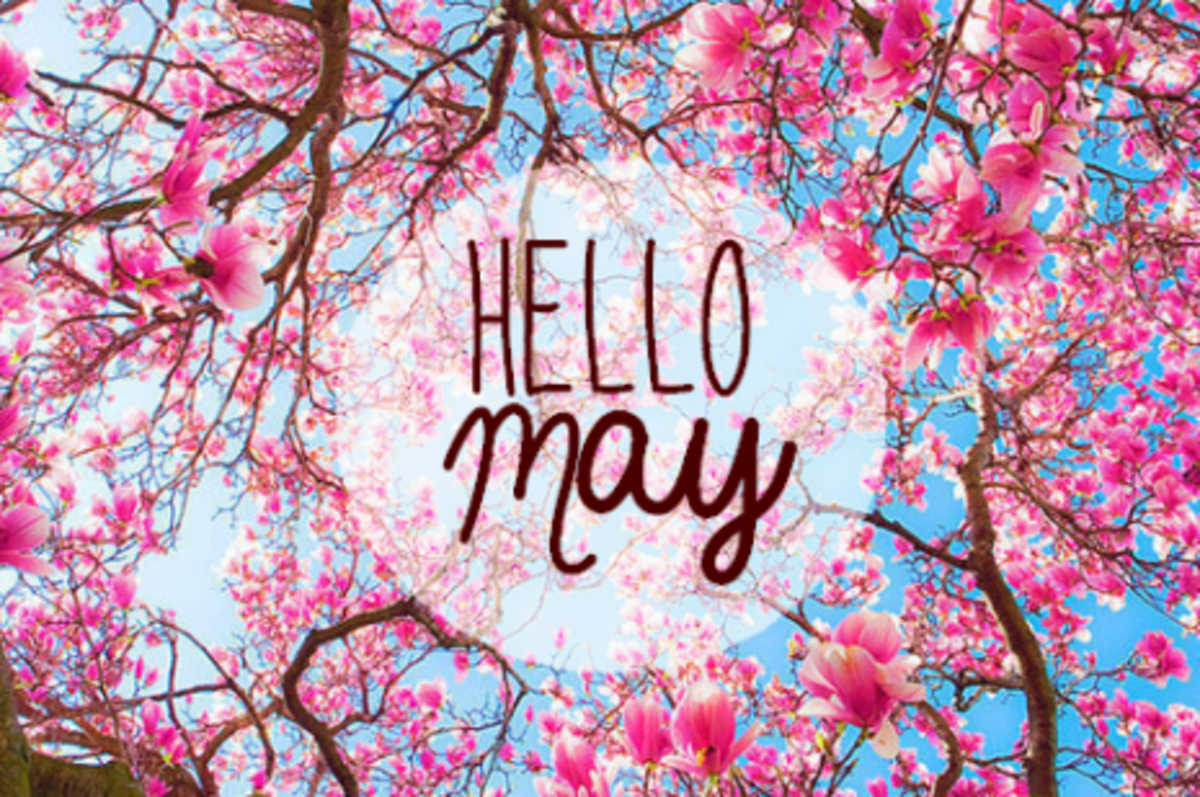May The 4th Be With You Yoda - Unpacking Language And Time
When we hear phrases that stick with us, like "may the 4th be with you yoda," it's almost like they have a life of their own, isn't that so? This particular saying, a bit of a playful twist on a well-known sentiment, brings together a specific date and a rather distinctive name. It makes us think about how words work, and how they can carry meaning, sometimes even when they're just part of a longer expression.
You know, it's pretty interesting how just one word, like "May," can have a couple of very different jobs in our language. It can be a name for a month, like the one we're in right now, or it can be a way to talk about wishes or things that might happen. Our written records, as a matter of fact, show us how "May" fits into the calendar year alongside other months, and also how it helps us express hopes or possibilities. It's really quite fascinating, you know, how these small words hold so much.
So, when we look at a phrase like "may the 4th be with you yoda," we can actually pull apart some of its pieces and see how they connect to the everyday workings of English. We can consider the month, the idea of something being possible, and even how dates are written down. It's a way to really appreciate the building blocks of language, and how they come together to form something memorable, or, like, a phrase that gets repeated quite a lot.
- Dazed And Confused Michelle
- Clinical Strength Secret Invisible Solid
- Emily Rudd Porn
- Portia De Rossi Divorced
- Will There Be A Freaky 2
Table of Contents
- The Calendar's Role in "may the 4th be with you yoda"
- "May" as a Month - What Does it Mean for "may the 4th be with you yoda"?
- The Power of "May" - Expressing Wishes and Hopes in "may the 4th be with you yoda"
- Unpacking "Maybe" and "May Be" - How Does This Affect "may the 4th be with you yoda"?
- The Fourth Day - What's Special About Dates in "may the 4th be with you yoda"?
- Understanding the Structure - How Does "may the 4th be with you yoda" Come Together?
- A Quick Look at Communication and Confirmation Around "may the 4th be with you yoda"
The Calendar's Role in "may the 4th be with you yoda"
When we talk about specific dates, like the "4th" in "may the 4th be with you yoda," we are, of course, thinking about the calendar. Our calendar uses names for each part of the year, and these names often have shorter versions that people use every day. For instance, January, the first month, is often called "Jan." February, the second one, often goes by "Feb." March, the third, is "Mar." And then, April, the fourth, is often seen as "Apr." It's just a way, you know, to make things a little quicker when writing dates or making notes.
These shortened names are pretty common, you know, when you look at a calendar or a schedule. We see "Jun" for June, "Jul" for July, and "Aug" for August. September is often "Sept," October becomes "Oct," November is "Nov," and December turns into "Dec." It's a system that helps us keep track of time in a way that is easy to write and read, which is rather handy for lots of things, like marking a special day or just knowing what time of year it is.
How Do We Shorten Month Names for "may the 4th be with you yoda"?
So, when we consider how month names get shortened, it's interesting to see the patterns. Most of them have a three-letter abbreviation, as we just went over. But then, there's May. May, as in the fifth month, is a bit of an exception, isn't it? It's already a very short word, just three letters long. Because of this, it doesn't usually get an abbreviation in the same way the others do. It's just "May," plain and simple, which is kind of neat, if you think about it.
- How Often Do People Get Their Nails Done
- Lalogonebrazzy Net Worth
- Kody Brown New Home
- Johnny Crawford As A Mouseketeer
- Addison Rae N Word
This little detail about "May" being its own short form is pretty unique among the twelve months. It means that when you see "May" written down, you know it's the full name and also the common way to refer to it in a short form. This is true for things like "may the 4th be with you yoda," where "May" is clearly the name of the month, not some other part of speech, you know, or a different kind of word.
"May" as a Month - What Does it Mean for "may the 4th be with you yoda"?
The word "May" in the phrase "may the 4th be with you yoda" points directly to the fifth month of the year. It's that time when spring is really getting going in many places, and it leads right into summer. Knowing that "May" is a specific month helps us pinpoint the exact day being talked about – the fourth day of that particular month. It's a way of being very precise with time, which is something we do all the time, obviously, when we plan things or talk about events.
This use of "May" as a calendar term is just one of its jobs in language. It's a very straightforward way to mark a period of time. When someone mentions "May," you immediately picture that part of the year, usually with some good weather and longer days. So, in the saying "may the 4th be with you yoda," this first word really sets the stage for the date, making it very clear what specific moment in time we are considering.
The Power of "May" - Expressing Wishes and Hopes in "may the 4th be with you yoda"
Beyond being a month, the word "may" also acts as a kind of helper word, or what we call a modal verb. When used this way, it lets us express wishes, hopes, or even prayers. It's a way of saying, "I hope this happens for you," or "I wish you well." For example, you might hear someone say, "May you have a good time," which is a way of wishing someone a pleasant experience. This particular use of "may" is often found in more formal kinds of language, or when someone is expressing a very heartfelt wish, you know, for another person.
So, when we hear "may the 4th be with you yoda," the "may" here is actually doing that job of expressing a wish. It's not just talking about the month; it's conveying a hope that something good, or a certain feeling, will be present with the person. This dual nature of the word "may" is pretty interesting, allowing it to serve both as a name for a part of the year and as a way to send good thoughts. It's quite a versatile word, you know, in how it works.
Is There a Difference Between "May" and "Might" When We Wish for "may the 4th be with you yoda"?
Now, some people might wonder about "may" and "might" because they seem a bit similar. Both can talk about possibility, but when it comes to expressing wishes or hopes, "may" is the one we use. Our language traditions show that "might" doesn't usually do this job. So, if you want to wish someone well, you would say "May you have a good day," not "Might you have a good day." It's a subtle but important difference in how these words are used, especially in formal ways of speaking.
There's also a situation where "may" and "might" can both appear in a discussion, often followed by "but." This is a way of saying "although" something might be true. For instance, "It may be raining, but we still need to go out," or "It might be a long drive, but it will be worth it." This shows their flexibility in talking about conditions or counterpoints, but for a direct wish, like in "may the 4th be with you yoda," it's always "may" that does the work, you know, of sending those good vibes.
Unpacking "Maybe" and "May Be" - How Does This Affect "may the 4th be with you yoda"?
It's pretty easy to mix up "maybe" and "may be" because they sound exactly the same, but they are actually different kinds of words, with different jobs. "Maybe" is one word, and it acts like an adverb. It means "perhaps" or "possibly." You often see it at the start of a sentence, like "Maybe it will rain later." It's a single word that expresses uncertainty, and it just sort of sits there by itself, you know, telling you something is possible.
On the other hand, "may be" is two separate words. Here, "may" is that helper word we talked about earlier, and "be" is a main verb. So, "may be" means "perhaps is" or "possibly is." For example, "She may be at the park" means it's possible she is there. The key thing is that "may be" always needs a verb after "may," because "may" is a helper for another action word. This distinction is quite important for getting your meaning across clearly, you know, when you're writing or speaking.
Why Does "Maybe" Stand Alone, While "May Be" Needs a Friend for "may the 4th be with you yoda"?
The reason "maybe" can stand alone is because it's a complete thought as an adverb. It's a word that modifies a whole sentence or an idea. It tells you about the likelihood of something. "Maybe we should go." It's just one word doing its job. But "may be," well, it's a team. "May" is a modal verb, and modal verbs don't usually work all by themselves to make a complete action. They need another verb, like "be," "go," or "do," to finish the thought. So, for instance, in "may the 4th be with you yoda," the "may" is connected to the "be," forming that wish, rather than being a single word like "maybe." It's a pretty clear distinction, actually, once you look at it closely.
This difference is quite important for how we build sentences and express ideas. When you use "maybe," you're making a general statement about possibility. When you use "may be," you're talking about the possibility of a specific state or action. It’s like, one is a general comment on likelihood, and the other is about a potential situation. Knowing this helps you understand the building blocks of phrases like "may the 4th be with you yoda," where the "may" is definitely working with "be" to express that hope or wish, you know, for something to happen.
The Fourth Day - What's Special About Dates in "may the 4th be with you yoda"?
The "4th" in "may the 4th be with you yoda" is pretty straightforward, isn't it? It just means the fourth day of the month. We use these numbers, like first, second, third, and so on, to mark specific points within a month. This is how we organize our time and make plans. When someone says "the 4th," everyone knows exactly which day they are talking about, assuming they also know the month. It's a basic part of how we communicate about time, obviously, and it helps us keep track of things.
So, when you put "May" and "the 4th" together, you get a very specific date: May the fourth. This precision is quite useful for all sorts of reasons, from setting appointments to remembering special occasions. It shows how our language uses numbers and month names to create a clear picture of when something is happening, or when something is wished to happen, like in the phrase "may the 4th be with you yoda." It’s just a very practical way, you know, to talk about time.
Understanding the Structure - How Does "may the 4th be with you yoda" Come Together?
When we look at the whole phrase, "may the 4th be with you yoda," we can see how the different parts work together. The "may" at the start, as we've discussed, is a wish, a hope for something to happen. It's like saying, "I hope that..." Then, "the 4th" specifies the day, linking it to the month of May, even if the month isn't explicitly stated right next to it in this particular phrasing. It's just understood from the context of the whole thing, you know, how these things often work.
The "be with you" part is the core of the wish itself. It expresses the idea of presence or companionship, or a certain positive feeling being shared. And then, the name "Yoda" here, well, it just acts as a particular identifier, you know, part of the whole expression. It's a specific name that completes the phrase, making it recognizable and memorable. So, the phrase combines a wish, a specific date, and a named entity, all woven together to create a distinctive saying that people recognize, apparently, and use.
A Quick Look at Communication and Confirmation Around "may the 4th be with you yoda"
While a phrase like "may the 4th be with you yoda" is a rather informal and playful expression, it’s interesting to think about how communication works in other settings. Sometimes, when you send a message, especially in more formal situations, getting a confirmation is a very big deal. For example, in some official communications, like emails about important papers, if you don't respond to a confirmation request, it can be taken to mean that you're giving up on something. It's a way of making sure everyone is on the same page, obviously, and that things are understood.
This contrasts quite a bit with a lighthearted saying. But it does show how different kinds of messages require different levels of interaction and confirmation. In a business or academic setting, a reply like "we'll do more investigation then get back to you asap" means there's a process, and you might need to wait for further information. It’s a very different kind of communication than a simple wish, you know, but it highlights how language is used in many different ways, depending on the situation and what needs to be accomplished.
This exploration has taken us through the specific roles of the word "May" as both a month and a modal verb for wishes, distinguishing it from "might." We also looked at the precise meanings of "maybe" and "may be." We considered how month abbreviations work, and how the "4th" specifies a date. Finally, we touched on how these linguistic components come together in the phrase "may the 4th be with you yoda," and how communication norms differ across contexts, from informal sayings to formal confirmations.

20 Marvelous Facts About May - The Fact Site

May month quotes: Quotes on May | May motivational quotes | Hello May

Interesting Things About the Month of May - HubPages